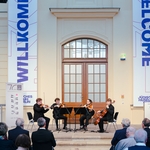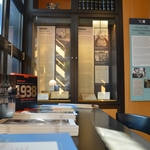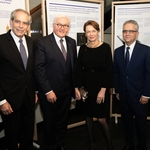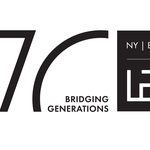Leo Baeck Medal for German Chancellor Angela Merkel
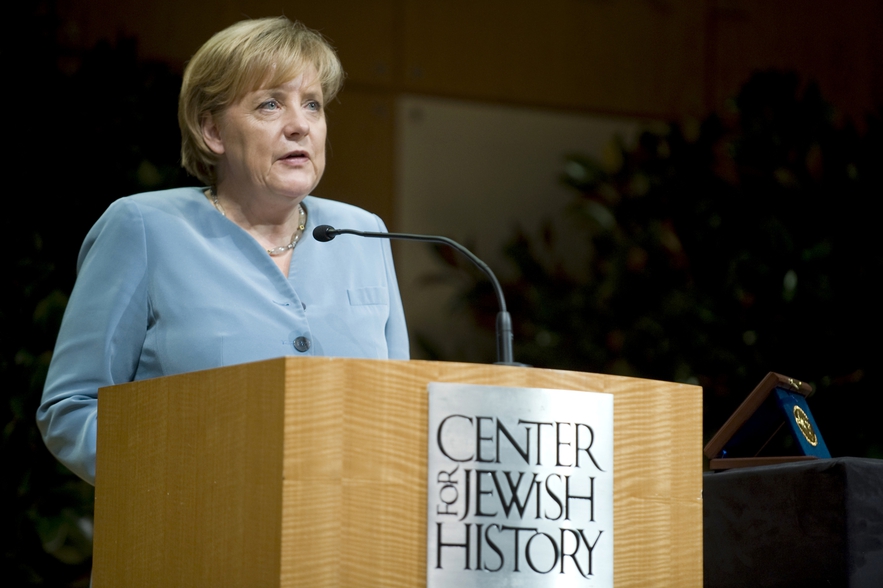
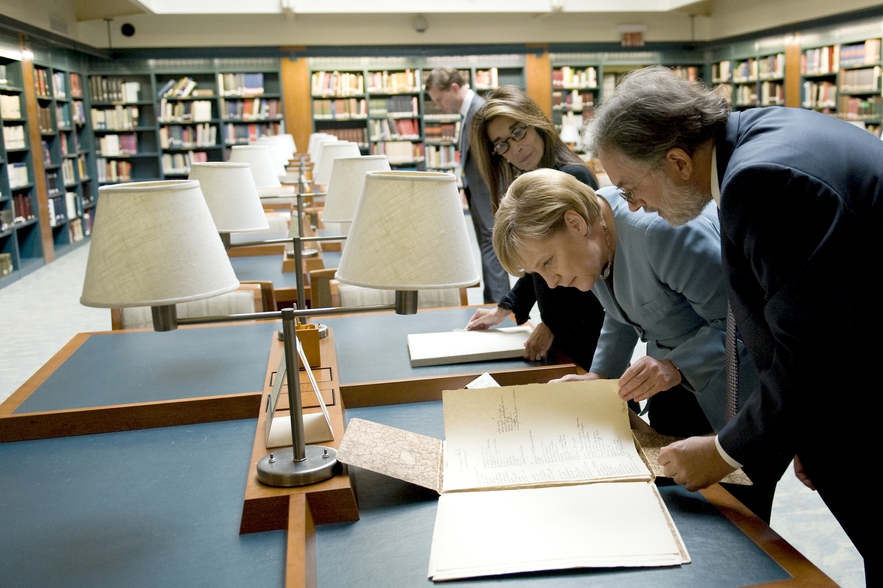
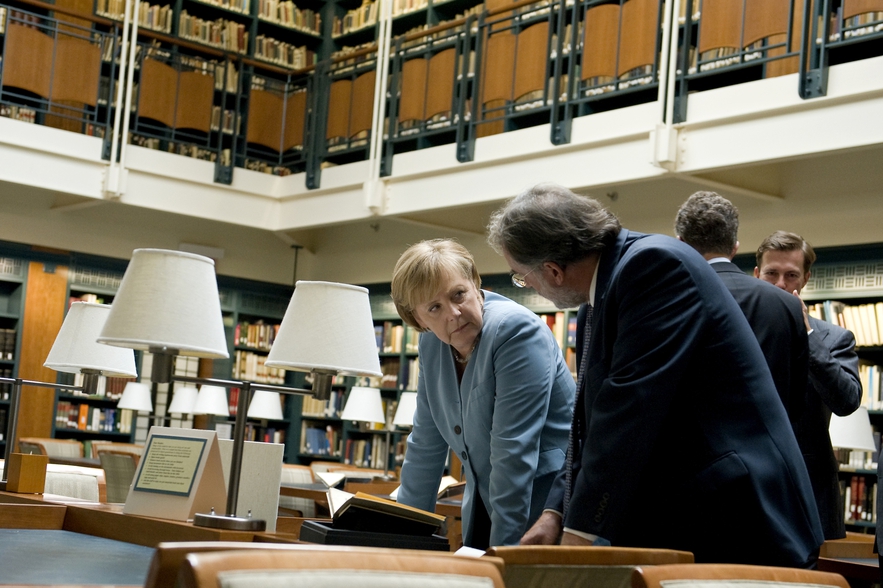
- Datum
- Mi., 22. Sep. 2010
Die deutsche Bundeskanzlerin Angela Merkel ist mit der Leo-Baeck-Medaille ausgezeichnet worden. Sie nahm die Auszeichnung am Dienstag, 21. September 2010, bei einer Zeremonie im Leo Baeck Institute in New York entgegen.
Zu allerersten Mal verlieh das Leo Baeck Institute seine Medaille an einen amtierenden deutschen Regierungschef in Anerkennung von Bundeskanzlerin Merkels Einsatz für ein gutes Verhältnis zwischen Deutschen und Israel sowie Deutschen und Juden weltweit. Bei der Preisverleihung würdigte der ehemalige US-Finanzminister W. Michael Blumenthal, der das Jüdische Museum in Berlin leitet, Merkels Einsatz für das jüdische Kulturleben und die Integration von Minderheiten in Deutschland. Merkel sagte, die Medaille sei eine Inspiration für die Fortsetzung der Integrationsarbeit und der Zusammenarbeit mit der jüdischen Gemeinschaft.
Vollständiger Text der Rede der Bundeskanzlerin Angela Merkel anlässlich des Erhalts der Leo Baeck Medal am 21. September 2010
Sehr geehrter Herr Präsident Blum,
sehr geehrte Frau Direktorin Kahn Strauss,
sehr geehrter Herr Professor Blumenthal,
sehr geehrte Vorstandsmitglieder und Freunde des Leo-Baeck-Instituts,
meine Damen und Herren,
herzlichen Dank, Herr Professor Blumenthal, für diese Laudatio, die mich sehr berührt hat. Die Leo-Baeck-Medaille zu erhalten, ist für mich ein zutiefst bewegender Moment. Herzlichen Dank auch dafür.
In Ihrem Lebensweg, Herr Professor Blumenthal, spiegelt sich – deshalb war es besonders anrührend, Sie heute zu hören – auch die Geschichte vieler deutscher Juden wider, die das Leo-Baeck-Institut immer wieder erzählt und lebendig hält. Sie haben Ihre Kindheit in Oranienburg und Berlin erlebt. Ihr Vater wurde ins Konzentrationslager Buchenwald verschleppt. – Die Gedenkstätte Buchenwald hat der amerikanische Präsident Obama letztes Jahr besucht. Ich durfte ihn begleiten. – Doch 1939 gelang Ihrer Familie die Flucht ins Shanghaier Exil. Von dort emigrierten Sie in die Vereinigten Staaten von Amerika und haben ein neues Leben aufgebaut – ein sehr erfolgreiches Leben. Als Präsidentenberater, als Finanzminister und als Unternehmer haben Sie Amerika große Dienste erwiesen.
Für uns – das darf ich als deutsche Bundeskanzlerin sagen – ist natürlich besonders bedeutsam, dass Sie Ihre Herkunft, Ihre Heimat, nie vergessen haben. Seit 1997 leisten Sie nun eine großartige Arbeit als Direktor des Jüdischen Museums in Berlin. Für die Zeit, die Kraft und die Leidenschaft, die Sie in diese Arbeit einbringen, und für Ihre gelebte Verbundenheit mit Deutschland möchte ich Ihnen zutiefst Dankeschön sagen.
Mein Dank gilt ebenso Ihnen, Herr Präsident Blum, sowie dem gesamten Vorstand des Leo-Baeck-Instituts. Ich möchte auch Ihnen, Frau Kahn Strauss, danken. Als Exekutivdirektorin haben Sie in den letzten 16 Jahren das Wirken des Leo-Baeck-Instituts geprägt – mit Ihrer Kompetenz, Ihren Erfahrungen, vielen Initiativen und – wer Sie kennen gelernt hat, der weiß das auch – mit Ihrer menschlichen Wärme.
Deshalb ist es mir eine ganz besondere Ehre, die Leo-Baeck-Medaille entgegennehmen zu dürfen. Ich sehe das als Ansporn und als Auftrag an, mich auch weiterhin für ein gedeihliches Miteinander mit der jüdischen Gemeinschaft einzusetzen. Dazu gehört vorneweg – ich muss sagen: leider ist das immer wieder nötig –, gegen Antisemitismus, gegen Fremdenfeindlichkeit und gegen Rassismus einzutreten.
Die Überlebenden der Shoah sind eindringliche Mahner – und das zu Recht –, bereits den Anfängen zu wehren. Ihre Stimme gegen das Vergessen und für ein friedliches Miteinander ist unvergleichbar eindringlich. Hinzu kommt die Arbeit eines Instituts wie des Leo-Baeck-Instituts. Sie übernehmen die verdienstvolle Aufgabe, Wurzeln, Traditionen und Einzelschicksale jüdischen Lebens in Deutschland den heutigen und den zukünftigen Generationen zu vermitteln.
Die reiche Geschichte jüdischen Lebens in Deutschland hat im schwärzesten Kapitel der deutschen Vergangenheit eine bittere Zäsur gefunden. Die systematische Ermordung von sechs Millionen Juden ist und bleibt unbegreiflich. Es gibt keine Worte dafür, das Unfassbare auch nur annähernd zu beschreiben. Es lässt uns vor den Opfern verstummen. Der Zivilisationsbruch der Shoah ist stete Mahnung, unserer Verantwortung für Freiheit, für Demokratie und für Toleranz immer wieder und jeden Tag gerecht zu werden. Es ist eine immerwährende Verantwortung im Dienste der Menschlichkeit.
Nur auf der Grundlage der Vergegenwärtigung des unermesslichen Leids und Verlusts können Aussöhnung und Verständigung wachsen. Auch deshalb bin ich dem Leo-Baeck-Institut für sein Engagement außerordentlich dankbar. Mit seinem Archiv schafft es einen wichtigen Zugang für die Gestaltung unserer gemeinsamen Zukunft. Es errichtet auch eine Brücke zwischen Deutschland und den Vereinigten Staaten, indem es die Lebenswege der aus Deutschland emigrierten Juden nachzeichnet.
Es erfüllt mich mit Dankbarkeit und Freude, sagen zu können: Heute haben wir in Deutschland wieder eine der größten jüdischen Gemeinschaften Europas. Wer hätte es für möglich gehalten, dass wir nach den unsäglichen Schrecken des Holocaust wieder ein blühendes jüdisches Leben in Deutschland haben würden?
Wir haben dies auch solch mutigen Wegbereitern wie Leo Baeck zu verdanken. Er verkörperte Toleranz und gegenseitigen Respekt zwischen Menschen jeglicher Herkunft. Seine unbeirrbare Haltung des Ausgleichs und der Verständigung war und bleibt Vorbild und Maßstab zugleich. Ich denke, solchen Maßstab und Einsatz für Verständigung und Frieden brauchen wir allemal auch in unseren Zeiten.
So haben Anfang dieses Monats in Washington erstmals seit fast zwei Jahren wieder direkte Verhandlungen zwischen Israel und Palästinensern begonnen. – Ich habe heute mit Präsident Abbas im Gebäude der Vereinten Nationen gesprochen und am Freitag mit dem israelischen Premierminister telefoniert. – Wir alle, so glaube ich, verbinden mit diesen Gesprächen die Hoffnung auf Fortschritte hin zur Umsetzung einer Zwei-Staaten-Lösung. Aber wir wissen auch, wie schwierig und kompliziert das noch sein wird. Deshalb muss von beiden Seiten auch immer wieder der Wille zur Verständigung und zum Kompromiss eingefordert werden. Wir wissen um die Schwierigkeiten auf diesem Weg. Ich glaube aber, trotz aller Enttäuschungen, die wir schon erlebt haben, müssen wir auch diese Chance nutzen. Deutschland ist gemeinsam mit seinen Partnern in der Europäischen Union und natürlich den Vereinigten Staaten dazu bereit, mit aller Kraft zum Friedensprozess beizutragen.
Wenn wir in diesen Tagen vom Ziel eines friedlichen Miteinanders im Nahen und Mittleren Osten sprechen, dann muss natürlich zwangsläufig auch das iranische Nuklearprogramm angesprochen werden. Es gibt nach wie vor erhebliche Zweifel an den Absichten des Iran. Deshalb muss der Iran die bestehenden Zweifel der internationalen Staatengemeinschaft am ausschließlich friedlichen Charakter seines Nuklearprogramms ausräumen. Das ist bisher nicht geschehen.
Es ist daher aus meiner Sicht ein großer Erfolg gewesen, dass im Sicherheitsrat der Vereinten Nationen eine Resolution verabschiedet werden konnte, die auf eine breite Mehrheit gestützt ist. Der Iran muss wissen, dass er die von den E3+3 unterbreiteten Angebote zur umfangreichen Kooperation mit der internationalen Staatengemeinschaft annehmen und an den Verhandlungstisch zurückkehren sollte, da ihm ansonsten weitere Isolation und eine konsequente Fortführung der Sanktionen drohen. Zu unseren Erwartungen an den Iran zählt auch, dass die Sicherheit und die Existenz des Staates Israel anerkannt werden. Beides ist für Deutschland niemals verhandelbar.
Meine Damen und Herren, internationale Aufgaben können nur international gelöst werden. Dabei ist es für Deutschland gut zu wissen, mit den Vereinigten Staaten einen verlässlichen Verbündeten, einen engen Partner und aufrichtigen Freund zu haben. Wir Deutsche – Professor Blumenthal hat auch darauf hingewiesen – feiern in wenigen Tagen den 20. Jahrestag unserer wiedergewonnenen staatlichen Einheit. Auch ich habe natürlich noch eine recht gute Erinnerung an diesen Tag vor 20 Jahren. Wir werden nicht vergessen, dass der Weg zur Einheit ohne die entschlossene und vertrauensvolle Unterstützung unserer Freunde in den Vereinigten Staaten nicht möglich gewesen wäre.
In dieser Freundschaft nimmt das Leo-Baeck-Institut einen festen Platz ein – als Brückenbauer zwischen Vergangenheit und Zukunft, als Brückenbauer zwischen unseren Völkern. Mit der Ehrung, die ich heute erfahren durfte, darf ich mich Ihnen nun auch ganz persönlich verbunden fühlen. Dies erfüllt mich Stolz und Freude. Und es wird mich anspornen, bei all den schwierigen politischen Problemen, die wir heute entsprechend der Maßstäbe von Leo Baeck zu lösen haben, noch mehr Kraft einzusetzen.
Herzlichen Dank.
Vollständiger Text der Rede von W. Michael Blumenthal, gehalten am Leo Baeck Institute am 21. September 2010
Madam Chancellor,
Dear Dr. Merkel,
Almost exactly 20 years ago, on October 3rd, 1990, I was among a small group of Americans invited to Berlin to witness the historic ceremonies of the formal reunification of the two Germanys.
Standing there among our German hosts, we felt their deep emotion and shared their joy as the Federal President and the German Chancellor stepped to the microphone to proclaim a reunited single German nation. The Peace Bell at the Schöneberg Rathaus began to chime, church bells all over the city joined in, and a giant German flag was being raised at the Reichstag.
Just then, with so much emotion enveloping us, one of the American guests turned to me with a question. Twice before, a powerful German nation had pursued misguided, undemocratic measures at home, and a foreign policy leading to two devastating wars and much human suffering. This time, he wanted to know, what were the prospects that the past would not be repeated, that this time the reunited Germany –again the major economic power on the continent of Europe – would nourish a strong domestic democracy, and be a force for peace in Europe and throughout the world?
As he whispered this question to me, he was not alone. Others, some in high places in Europe and elsewhere with long historical memories, were asking the same question – openly, or by implication – even as they applauded the reunification miracle and wished their German friends well. In some ways, their concerns were understandable. Along with adapting to the rapid pace of change in a globalized world, the costs of reunification promised to be extraordinarily high. Environmental degradation in the former DDR was formidable, its infrastructure in a deplorable state. With 16 million East Germans inexperienced in democratic ideas clamoring for rapid change, could domestic tranquility, and would the adherence to democratic ideals, be preserved? Difficulties and disappointments were sure to come. And what would happen then, when the going got tough? With an increasing number of ethnic and religious minorities in the land, might there again be a rise in intolerance, and a search for scapegoats?
How strong, in other words, was the reunited Germany’s commitment to European unity, Atlantic Partnership and Peace in the World, on the one hand, and to the dignity of the individual citizen, to liberty, justice, and freedom of religion embedded in the first articles of its Constitution, on the other?
The answer I gave to my American colleague that day was, as I recall it, that only the future would tell, but that I was hopeful. That, above all, much in the years ahead would depend on the quality of German leaders: on their wisdom and courage in confronting the problems with steadfast adherence to democratic principles and the protection of the rights of all minorities at home, even in difficult times, opposing demagoguery and intolerance, and to the role of Germany as a force for peace with its partners in Europe and like-minded nations throughout the world.
Madam Chancellor, today the answer is no longer in doubt. The early challenges have been successfully met, even as new ones arise and are faced under your leadership. The Federal Republic of Germany continues to be a key force in the European Union and a reliable partner with other nations in the fight against intolerance and terrorism and in the search for peace in the Middle East and other world trouble spots. Domestically, the commitment to the fundamental principles of dignity and justice for all German citizens remains as strong as ever.
Nor has the past been forgotten. Widespread public support, under your leadership, of the many institutions of remembrance – from the Holocaust Memorial in Berlin, to the Jewish Museum, the Topography of Terror, and many others – bears witness to your determination and that of the vast majority of today’s generation of Germans not to forget, but to learn from the past, to keep alive the memory of Jewish life in Germany and how it was destroyed, and to nurture and protect its rebirth, ensuring that neither antisemitism nor discrimination toward any religious or ethnic minority will again find a foothold in your land.
Those of us who were born in your country, and whose families lived there for many generations, are especially cognizant of the spirit of this new Germany, and we salute you as a strong leader and outstanding symbol of it.
The Leo Baeck Institute was established by former German Jews dedicated to keeping alive the centuries-old record of German Jewry. Often, though regrettably not always, our ancestors were allowed to live peacefully side by side with their neighbors, and when they could do so, they proved their loyalty to their homeland many times over, contributing importantly to Germany’s march into modernity and to all phases of German economic, scientific and cultural life. To maintain this historical record, with all its ups and downs, its triumphs and its tragedies, remains the mission of this institution to this day.
The Institute, and the medal we are proud to present to you this day, bears the name of a person who symbolizes the best of that history. Educated as a Jewish theologian, Leo Baeck was at the same time a philosopher and scholar. The graduate of a German university, he was a leader respected both for his Judaism and his Germanism, who believed in the Kantian concept of loyalty to the State and individual morality. As a patriot, he was one of the first to volunteer for duty as a military chaplain in the Great War. And throughout his life, he was a builder of bridges – between Christians and Jews, Zionists and non-Zionists, and Orthodox, Conservative and Reformed practitioners of the Jewish faith.
As a theologian, he taught that the dignity of the individual and individual morality were the essence of the central meaning of Judaism. He was a man of great integrity and quiet courage, even in the darkest days. A fierce opponent of the Nazi dictatorship, he worked with its opponents when he could, and met its outrages with quiet dignity when nothing else was possible. Even in the worst of times, he was a leader with the sense of responsibility and courage to do his duty as best he could. Fighting to save as many Jews as possible, he traveled to England to plead their case as late as 1939 yet, offered a place for himself, chose to return and remain at their side in their hour of greatest need. ‘As long as there is a single Jew left in Germany, this is where I belong,’ he said.
And even at the very end, when the war was over but a deadly typhus epidemic cost the lives of many more of his fellow Theresienstadt prisoners, he refused early rescue and stayed at their side till the worst had passed. And always, he remained a builder of bridges. When finally leaving in 1945, after the horrible crimes against his people, he had the courage to remind his fellows of for many then a virtually unacceptable truth – not to forget those Germans, albeit all too few, who had helped the Jews, and, as he put it, “to record their name in a Golden Book.”
Leaving to rejoin his family in 1945, in despair over what had happened, Leo Baeck would say that he thought “the history of German Jewry is definitely at an end.” Today we know that in this he was not correct, and in later years in his various visits to the early postwar Germany he himself began to change his mind.
The real miracle of a rebirth of Jewish life in Germany, however, has occurred in more recent times, and especially since reunification. Today, over 200,000 Jews again call Germany their home, a number that continues to grow. Jewish life flourishes, there are synagogues in all the major cities and many smaller ones, Jewish schools, even a rabbinical seminary, and an active Jewish cultural life. Germany’s Jews are full citizens with equal rights, and their special needs and concerns are respected, protected and honored.
You, Madam Chancellor, are a worthy successor among Germany’s postwar leaders who have followed the policies to make all this possible. Indeed, you are an especially fitting symbol of it. As Chancellor of Germany in complex times, you face many challenges. Yet as a former East German, you understand more clearly than most the need to counter the arbitrary power of dictatorial regimes in opposition to freedom of thought and spirit, and to be resolute against those who would stoke the flames of populist resentments against the rights of any religious or ethnic minority at home. For this we thank you.
We followed your visit to Israel two years ago with admiration, and were gratified by the words you spoke there: recognizing Germany’s responsibility for the past, pledging to make amends where possible, and reiterating Germany’s position as Israel’s friend and supporter in the difficult quest for a durable peace in the region. And at a very human level, we salute your recent personal encouragement for the private joint efforts of Jewish and Palestinian families in search of that peace.
Your unequivocal stand in the Sarrazin controversy against demagogic and racist language directed at any minority, and your support of positive policies needed to integrate recent immigrants into German life, we see as further proof of your willingness to exert the moral leadership of your position as a builder of bridges, a leadership that is in full accord with the spirit of Leo Baeck.
At difficult moments, when there may be those tempted to exploit the popular resentments of some against a minority for political gain, your principled stand in their defense – be they Jews, ethnic Turks or Roma, is especially gratifying.
As the Leo Baeck Institute pursues its mission to serve as a repository of the history of German Jewish life – here in New York, and in partnership with the Jewish Museum in Berlin – we hope to do what we can to support your efforts. It is a partnership we expect to be further strengthened when the Museum’s new education building, financed with your approval partly with federal funds, and partly by contributions from German and American friends, opens next year. For the history of Jewish/non-Jewish relations in Germany is an excellent paradigm for what can be accomplished when things go well, and what is at risk when they fail. We intend to utilize these new resources to work with young Germans of all ethnic background and faiths, using that history to show that rejecting antisemitism and working for tolerance for all minorities and their integration into German life will benefit all.
In your remarkable career, Madam Chancellor, there have been many firsts: first German Chancellor born after the Great War; first woman; and first to have grown up on the eastern side of the Wall that divided Germany. And it took a special resolution of the Knesset for you to become the first German Chancellor to speak there, an honor normally reserved only to heads of state.
Today, Madam Chancellor, we would like to add another modest first to that long list. In presenting the Leo Baeck Medal to you, expressing our thanks for what you have done, and are doing, on behalf of Jewish life in Germany, on behalf of all minorities, and for peace – you will be the first German Chancellor to receive this award.
Aktuelles
